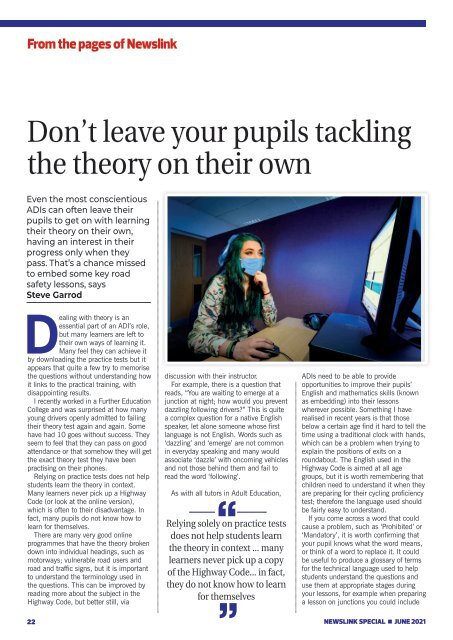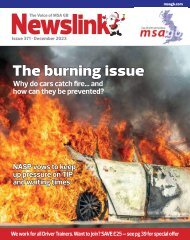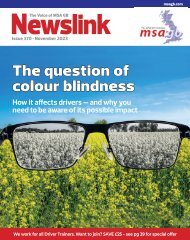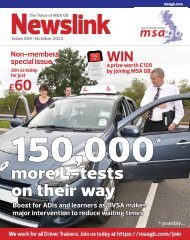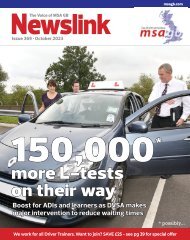MSA Newslink Marketing Special
Motor Schools Association of Great Britain Introductory magazine; membership offers and joining information for non-members
Motor Schools Association of Great Britain Introductory magazine; membership offers and joining information for non-members
Create successful ePaper yourself
Turn your PDF publications into a flip-book with our unique Google optimized e-Paper software.
From the pages of <strong>Newslink</strong><br />
Don’t leave your pupils tackling<br />
the theory on their own<br />
Even the most conscientious<br />
ADIs can often leave their<br />
pupils to get on with learning<br />
their theory on their own,<br />
having an interest in their<br />
progress only when they<br />
pass. That’s a chance missed<br />
to embed some key road<br />
safety lessons, says<br />
Steve Garrod<br />
Dealing with theory is an<br />
essential part of an ADI’s role,<br />
but many learners are left to<br />
their own ways of learning it.<br />
Many feel they can achieve it<br />
by downloading the practice tests but it<br />
appears that quite a few try to memorise<br />
the questions without understanding how<br />
it links to the practical training, with<br />
disappointing results.<br />
I recently worked in a Further Education<br />
College and was surprised at how many<br />
young drivers openly admitted to failing<br />
their theory test again and again. Some<br />
have had 10 goes without success. They<br />
seem to feel that they can pass on good<br />
attendance or that somehow they will get<br />
the exact theory test they have been<br />
practising on their phones.<br />
Relying on practice tests does not help<br />
students learn the theory in context.<br />
Many learners never pick up a Highway<br />
Code (or look at the online version),<br />
which is often to their disadvantage. In<br />
fact, many pupils do not know how to<br />
learn for themselves.<br />
There are many very good online<br />
programmes that have the theory broken<br />
down into individual headings, such as<br />
motorways; vulnerable road users and<br />
road and traffic signs, but it is important<br />
to understand the terminology used in<br />
the questions. This can be improved by<br />
reading more about the subject in the<br />
Highway Code, but better still, via<br />
22<br />
discussion with their instructor.<br />
For example, there is a question that<br />
reads, “You are waiting to emerge at a<br />
junction at night; how would you prevent<br />
dazzling following drivers?” This is quite<br />
a complex question for a native English<br />
speaker, let alone someone whose first<br />
language is not English. Words such as<br />
‘dazzling’ and ‘emerge’ are not common<br />
in everyday speaking and many would<br />
associate ‘dazzle’ with oncoming vehicles<br />
and not those behind them and fail to<br />
read the word ‘following’.<br />
As with all tutors in Adult Education,<br />
‘‘<br />
Relying solely on practice tests<br />
does not help students learn<br />
the theory in context ... many<br />
learners never pick up a copy<br />
of the Highway Code... in fact,<br />
they do not know how to learn<br />
for themselves<br />
‘‘<br />
ADIs need to be able to provide<br />
opportunities to improve their pupils’<br />
English and mathematics skills (known<br />
as embedding) into their lessons<br />
wherever possible. Something I have<br />
realised in recent years is that those<br />
below a certain age find it hard to tell the<br />
time using a traditional clock with hands,<br />
which can be a problem when trying to<br />
explain the positions of exits on a<br />
roundabout. The English used in the<br />
Highway Code is aimed at all age<br />
groups, but it is worth remembering that<br />
children need to understand it when they<br />
are preparing for their cycling proficiency<br />
test; therefore the language used should<br />
be fairly easy to understand.<br />
If you come across a word that could<br />
cause a problem, such as ‘Prohibited’ or<br />
‘Mandatory’, it is worth confirming that<br />
your pupil knows what the word means,<br />
or think of a word to replace it. It could<br />
be useful to produce a glossary of terms<br />
for the technical language used to help<br />
students understand the questions and<br />
use them at appropriate stages during<br />
your lessons, for example when preparing<br />
a lesson on junctions you could include<br />
NEWSLINK SPECIAL n JUNE 2021


